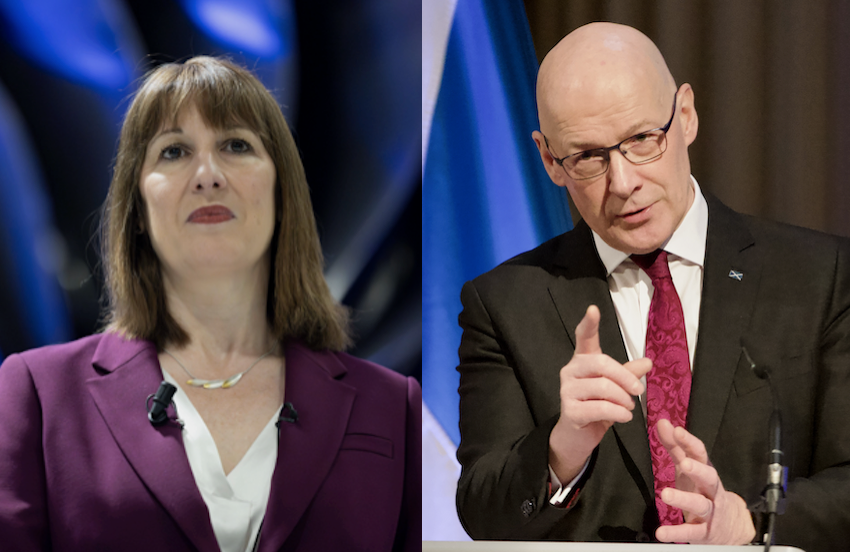Reeves and Swinney unveil plans for ‘renewal’ – Daily Business



Chancellor Rachel Reeves will unveil a 10-year Infrastructure Strategy this week aimed at bringing a more co-ordinated approach to rebuilding roads, railways and other basic services that underpin the economy.
It coincides with two announcements that will be made by Scotland’s First Minister John Swinney on the need for national “renewal” in which he will put independence firmly back on the agenda. He will say how “years of lost opportunity must spur us on to building a better future”.
Ms Reeves sees her strategy as central to rebuilding the economy and providing greater certainty for businesses to invest.
To support delivery of this first-of-its-kind, cross-sector strategy, the government is funding at least £725 billion over the next decade.
Ms Reeves said “a dereliction of duty by previous governments overseeing an era of managed decline…ends with this one.
She will explain how a “disjointed “approach will be avoided going forward, setting up the National Infrastructure and Service Transformation Authority (NISTA) which will ensure projects are delivered on time, on budget, and with maximum public benefit.
It comes as more questions are asked about the late and over-budget HS2 rail line which critics have lambasted as a vanity project, costing the taxpayer billions that could have underpinned investment in transport across the UK.
Ms Reeves describes her strategy as a defining moment in the government’s plan that will provide long-term certainty for industry and communities, “ensuring that infrastructure is delivered faster, more efficiently, and with greater impact.
“We are investing in Britain’s future, brick by brick, road by road and track by track. The strategy will rebuild people’s pride in their homes, while growing the economy.”
Becky Wood, chief executive of NISTA, said Infrastructure is the “backbone supporting our nation”, adding: “This strategy is a decisive step forward for our nation’s infrastructure, providing the stability that businesses, investors and communities need, as well as tackling head on the fundamental issues that the sector has experienced over recent years.”
The strategy comes amid a weakening economy, with GDP and recruitment falling as companies cope with the rising costs imposed by the Chancellor in last October’s budget. There are also concerns that she will be forced to raise taxes in the autumn.
It is not clear how the strategy will impact on the devolved nations. In the meantime, Mr Swinney will launch his own plan for national renewal during back-to-back keynote events this week that will focus more on rebuilding public services.
Tomorrow (Monday), he will address an audience of guests from across health, local government, education, justice and the third sector in Glasgow.


He will outline his vision over the medium to long-term and how new technology is key to delivering better outcomes. He will focus on the necessity of a decisive shift to preventative interventions and some of the key successes in Scotland on this approach in recent years.
On Tuesday, he will address the Scotland 2050 Conference in Edinburgh, urging people to consider what we want our country to look like in the middle of the twenty-first century, and set out how independence is key for us to achieving that shared vison.
In comments that revive the independence message, Mr Swinney said: “Times are tough right now for a lot of people – and when that is the case, it can be easy to forget how much there is to be positive about in Scotland.
“As First Minister, I see so much collaboration, ingenuity and innovation taking place around the country. Our collective task is to harness what is going well ensure every part of Scotland can thrive.
“When you look back over the last few years, the UK has been a perfect example of how not to prepare for the future.
“After the devastating financial crash of 2008, Westminster’s response was not to hold those who were responsible to account – but rather to punish those not responsible.
“Social security support was taken from vulnerable people, funding for vital public services was cut and living standards were eroded.
“It was morally wrong – but when you consider how austerity negatively affected our nation’s health, our skills base and our infrastructure, it is clear that that short-sighted decision has also been fiscally disastrous in the long-term.
“Why cut funding to invest in new technologies when we know it can save in the long term?
“Why take away young people’s opportunities if it will reduce their potential to thrive as adults?
“Why cut the winter fuel payment if it leads to older people more exposed to ill health?
“Just imagine where Scotland could be today as a nation – just think what our public services could look like – had we not been subject to a decade and a half of Westminster austerity. The harsh lesson of that 15 years of lost opportunity must spur us on to building a better future – let us deliver a spirit of optimism and hope.
“In the year 2050, do we want to be looking back on how we picked up the pieces from another 25 years of Westminster mismanagement? Or should we look around us at our immense potential today, and have the confidence that we can do better with the full powers of independence?
“The Scotland I seek is modern and dynamic; it is an enterprising, compassionate, forward-looking nation that is well-placed to ride the waves of change rather than being buffeted by them, rather than being overwhelmed by them.
“A Scotland where tomorrow is better than today because – together – we have made it so.”
#Reeves #Swinney #unveil #plans #renewal #Daily #Business




